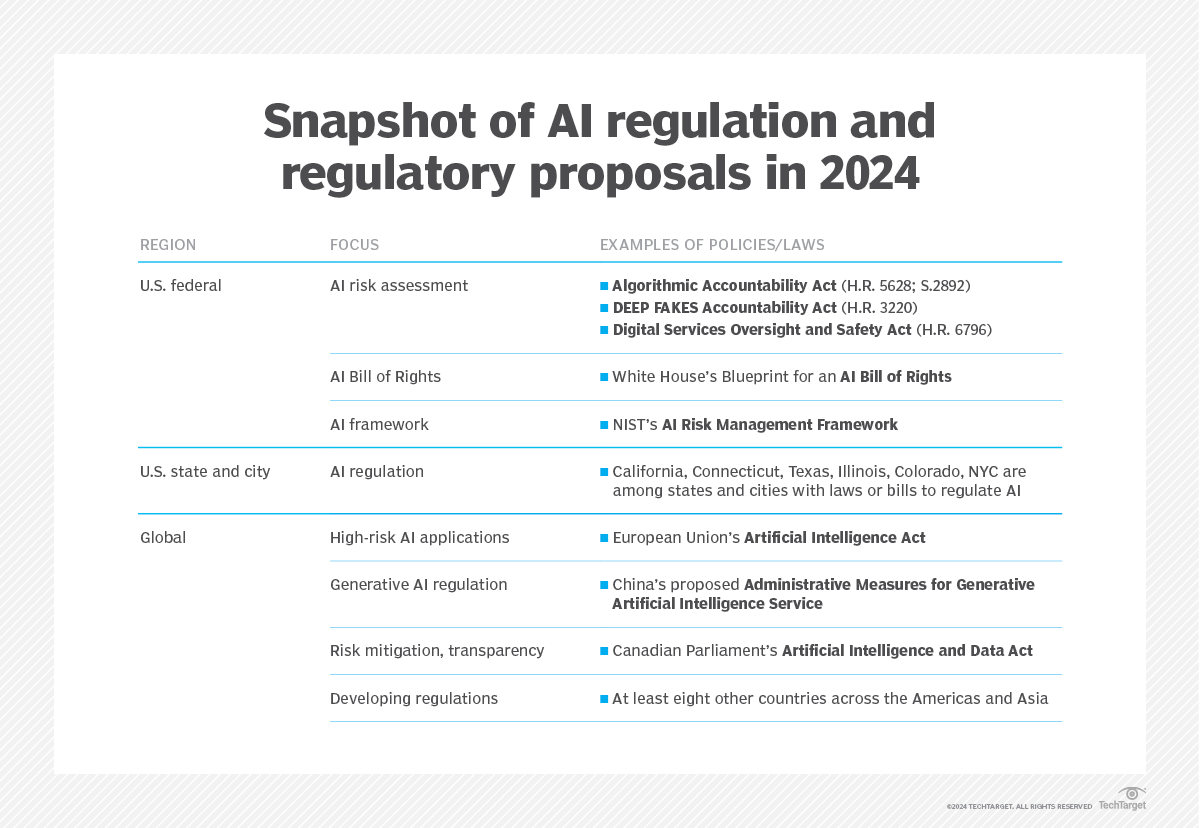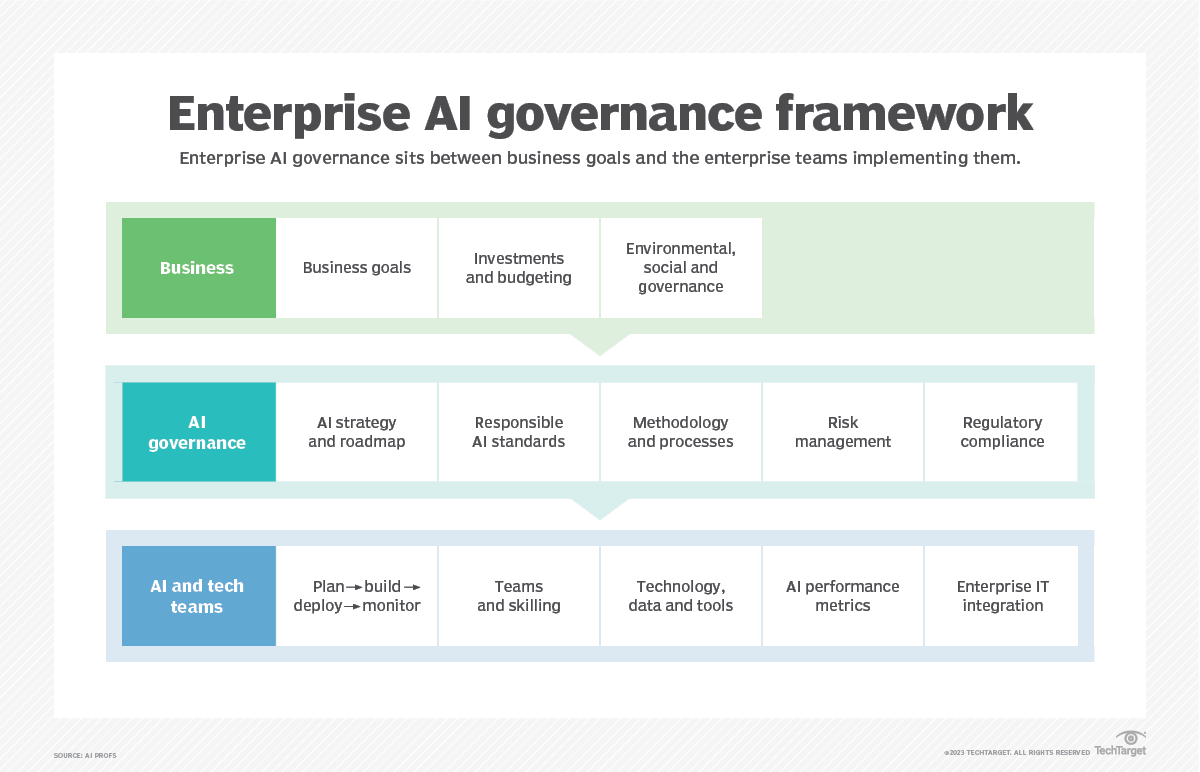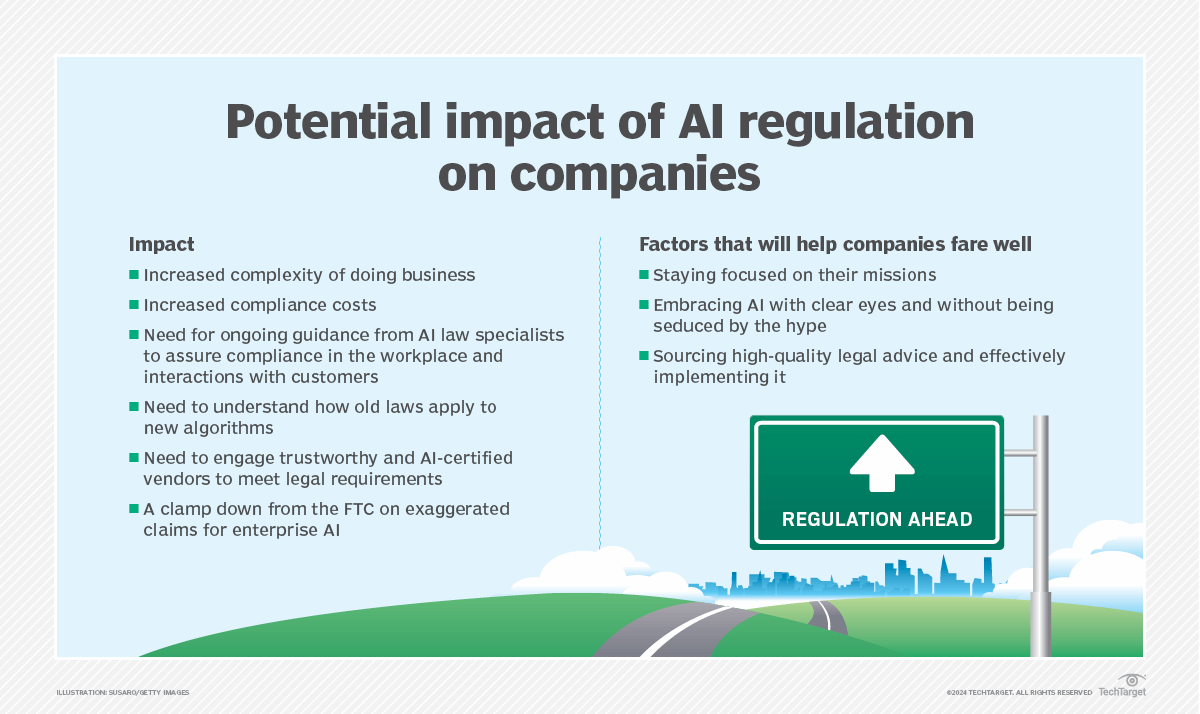By Nick Barney
What is artificial intelligence (AI) governance?Artificial intelligence governance is the legal framework for ensuring AI and machine learning technologies are researched and developed with the goal of helping humanity navigate the adoption and use of these systems in ethical and responsible ways. AI governance aims to close the gap that exists between accountability and ethics in technological advancement.
AI use is rapidly increasing across nearly all industry sectors, including healthcare, transportation, retail, financial services, education and public safety. As a result, governance has taken on a more significant role and is getting more attention than in the past.
The main focus areas of AI governance are AI as it relates to justice, data quality and autonomy. Overall, AI governance determines how much of daily life can be shaped by algorithms and who is in control of monitoring it. Some of the key concerns governance seeks to address include the following:
Assessing the safety of AI.
Determining which sectors are appropriate for AI automation.
Establishing legal and institutional structures around AI use and technology.
Defining the rules around control and access to personal data.
Dealing with moral and ethical questions related to AI.
Why AI governance is needed?AI governance is necessary where machine learning algorithms are used to make decisions. Machine learning biases, particularly in terms of racial profiling, can incorrectly identify basic information about users, which results in unfairly denying access to healthcare and loans as well as misleading law enforcement in identifying criminal suspects. AI governance determines how best to handle scenarios where AI-based decisions could be unjust or violate human rights.
The rapid adoption of AI tools, systems and technologies in various industries raises concerns about AI ethics, transparency and compliance with other regulations, such as the General Data Protection Regulation. Without proper governance, AI systems could pose risks such as biased decision-making, privacy violations and misuse of data. AI governance seeks to facilitate constructive use of AI technologies while protecting user rights and preventing harm.
 AI governance pillars
AI governance pillarsThe White House Office of Science and Technology Policy's National Artificial Intelligence Initiative Office created an AI governance framework built on the following six pillars:
Innovation. Facilitating efforts in business and science to harness and optimize AI's benefits.
Trustworthy AI. Ensuring AI doesn't violate civil liberties, the rule of law, data privacy and transparency.
Educating and training. Encouraging the use of AI to expand opportunities and access to new jobs, industries, innovation and education.
Infrastructure. Focusing on expanding access to data, models, computational infrastructure and other infrastructure elements.
Applications. Expanding the application of AI technology across the public and private sectors including transportation, education and healthcare.
International cooperation. Promoting international collaboration and partnerships built on evidence-based approaches, analytical research and multistakeholder engagements.
Some other components of a strong AI governance framework include the following:
Decision-making and explainability. AI systems must be designed to make fair and unbiased decisions. Explainability, or the ability to understand the reasons behind AI outcomes, is important for building trust and accountability.
Regulatory compliance. Organizations must adhere to data privacy requirements, accuracy standards and storage restrictions to safeguard sensitive information. AI regulation helps protect user data and ensure responsible AI use.
Risk management. AI governance and responsible use ensures effective risk management strategies, such as selecting appropriate training data sets, implementing cybersecurity measures, and addressing potential biases or errors in AI models.
Stakeholder involvement. Engaging stakeholders such as CEOs, data privacy officers and users is vital for governing AI effectively. Stakeholders contribute to decision-making, provide oversight, and ensure AI technologies are developed and used responsibly over the course of their lifecycle.
 Future of AI governance
Future of AI governanceThe future of AI governance will rely on collaboration among governments, organizations and stakeholders. Its success will depend on developing comprehensive AI policies and regulations that protect the public while fostering innovation. Complying with data governance rules and privacy regulations as well as prioritizing safety, trustworthiness and transparency are also important to the future of AI governance.
Various companies are focused on the future of AI governance. For instance, in 2022, Microsoft released version 2 of its "Responsible AI Standard," a guide for organizations managing AI risks and incorporating AI governance into their strategies.
U.S. government organizations working in this area include the White House Office of Science and Technology Policy's National Artificial Intelligence Initiative Office, which launched in 2021. The National Artificial Intelligence Advisory Committee was created in 2022 as part of the National AI Initiative to advise the president on AI-related issues.
Some AI experts insist that a gap exists in the legal framework of AI accountability and integrity. In 2023, technology leaders and AI experts such as Elon Musk and Steve Wozniak signed an open letter urging a temporary halt to AI research and the codifying of legal regulations. In the same year, the CEO of OpenAI, Sam Altman, testified before Congress urging AI regulation.

AI governance is the responsible regulation of artificial intelligence in the private and public sector. Learn what businesses need to know about AI regulation.
Source: techtarget
Original Content:
https://shorturl.at/dvMS0